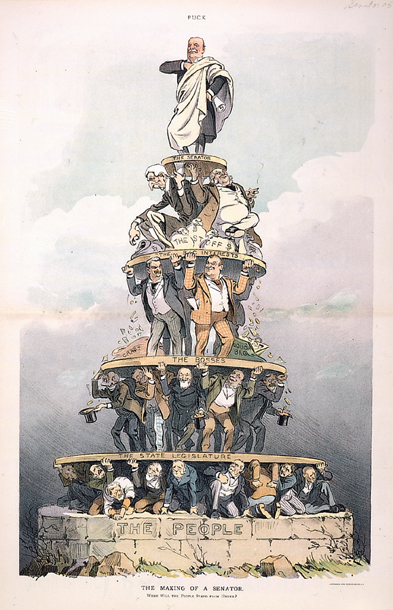
Joseph Keppler, "The Bosses of the Senate, Puck, January 23, 1889
Failed presidential candidate and diet book author Mike Huckabee says sometimes there's just too damned much democracy in America.
Huckabee, whose Arkansas proteges include former Family Research Council figurehead, adulterer and incest enthusiast Josh Duggar, and the former governor's daughter, Trump press flack Sarah Huckabee Sanders, is so keen to emulate the President that he, too, tweets stupid thoughts in the middle of the night:
Time to repeal 17th Amendment. Founders had it right-Senators chosen by state legislatures. Will work for their states and respect 10th amid— Gov. Mike Huckabee (@GovMikeHuckabee) July 28, 2017
The Huckster- like many other GOP insiders who know the demographic hinge is closing on them- wants to strip Americans of the right to choose their own senators and return to the pre-1913 method of selection by state legislatures, with the power to instruct senators how to vote.
He's not alone. Senators Ted Cruz, Jeff Flake, and Mike Lee- all from states with traditions of pre-1913 Senate elections controlled by natural-resource barons, are for the change, as is Energy Secretary and former Texas Governor Rick Perry. Justice Antonin Scalia- who died at the private hunting reserve of a Texan with business before the Court- was another cheerleader for corporate democracy. Now the charge is being led by the Koch Bros.' creature, ALEC.
Going backward is popular now because the GOP has gerrymandered itself into long-term control of a majority of US legislatures. Under repeal, they could, overnight, gain a huge Senate majority.
If the 17th Amendment was repealed now, Republicans controlling both houses in 32 states could choose 64 GOP senators- just three shy of a veto- proof majority (and four over a filliuster-proof one) and the power to pass constitutional amendments a GOP-controlled House would be eager to ape.
In its first iteration, the process looked like this:

Joseph Keppler, The Making of A Senator, Puck, November 18. 1905. The richest man in the world, John D. Rockefeller, is seated just under the senator, on the left.
As industrial combines and the vast wealth of new, monied classes swept Gilded Age America, among their privileges became the purchase of legislatures and through then, Senate seats.
Thus Delaware had Senator Henry A. DuPont from 1906 to 1917 (he assumed the seat after a fourteen-month period when the legislature could not agree on senator; a seat was also vacant for that reason from 1899 to 1903). From 1881 to 1911 the Rhode Island legislature sent Nelson W. Aldrich to the Senate, where he became wealthy through regulatory oversight of streetcars, rubber, sugar, and banking, and married his daughter to John D. Rockefeller, Jr.
One of Montana' copper kings, William A. Clark, was so transparent in his bribery of that state's legislature that the US Senate refused to seat him in 1899. The silver king, Simon Guggenheim, was a Colorado senator from 1907 to 1913; when the 17th Amendment was adopted, he retired and moved back to New York.
In the period 1865 to 1913, Republicans controlled the Senate with lopsided majorities for all but six of 48 years (for the 60th Congress, 1907-09, the margin was 61-29).
Infighting within state parties- not unlike the GOP today, also stymied elections. One source notes,
Electoral deadlocks were another issue. Because state legislatures were charged with deciding whom to appoint as senators, the system relied on their ability to agree. Some states could not, and thus delayed sending representatives to Congress; in a few cases, the system broke down to the point where states completely lacked representation in the Senate.Deadlocks started to become an issue in the 1850s, with a deadlocked Indiana legislature allowing a Senate seat to sit vacant for two years. Between 1891 and 1905, 46 elections were deadlocked across 20 states; in one extreme example, a Senate seat for Delaware went unfilled from 1899 until 1903. The business of holding elections also caused great disruption in the state legislatures, with a full third of the Oregon House of Representatives choosing not to swear the oath of office in 1897 due to a dispute over an open Senate seat. The result was that Oregon's legislature was unable to pass legislation that year.North Carolina was the seventh state to ratify the 17th Amendment to allow direct election of senators.
Seven states refused to even act on it: Florida, Georgia, Kentucky, Mississippi, South Carolina, and Virginia.
With change, however, comes risk: but for the 17th Amendment, the rise of the GOP as a Southern Party would have been delayed for decades. Jesse Helms would never been elected a senator by North Carolina Democrats who controlled the General Assembly through his thirty-year tenure.
Tim Scott, the token African-American GOP senator from South Carolina, would never have been appointed by the South Carolina Legislature's Republican majority- which also picks judges internally and calls it "elections."
No comments:
Post a Comment